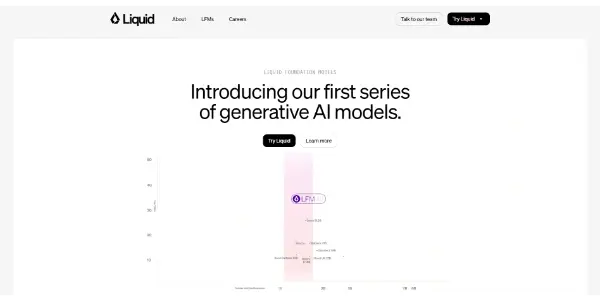Liquid AI

A set of powerful generative AI models called LFM. Get superior performance to traditional large language models, while using less memory and computing resources
Liquid AI: A Deep Dive into High-Performance, Resource-Efficient Generative AI
Liquid AI offers a compelling alternative to traditional large language models (LLMs) with its suite of powerful generative AI models, collectively known as LFMs (Liquid Function Models). These models boast superior performance while demanding significantly less memory and computing resources, making them a compelling option for developers seeking efficient and effective AI solutions.
What Liquid AI Does
Liquid AI's core functionality revolves around providing developers with access to its advanced LFMs. These models are designed to perform a variety of generative tasks, including text generation, code completion, and other complex AI operations. Unlike traditional LLMs that often require substantial computational power and memory, LFMs are optimized for efficiency, allowing them to deliver comparable or even superior results with a smaller footprint. This efficiency translates to cost savings and faster processing times.
Main Features and Benefits
- Superior Performance: Liquid AI emphasizes delivering superior performance in key metrics compared to traditional LLMs, including accuracy, fluency, and coherence in generated text and code.
- Resource Efficiency: This is a key differentiator. LFMs are designed to minimize memory and compute requirements, making them suitable for deployment on resource-constrained environments and lowering operational costs.
- Generative Capabilities: LFMs support a range of generative tasks, offering versatility for diverse applications.
- Developer-Friendly: The platform is likely designed with developers in mind, offering APIs and tools for easy integration into existing workflows and applications. (Further details would be needed from the official Liquid AI documentation to elaborate on specific API features.)
- Scalability: Although specifics are needed from the official documentation, the resource-efficient nature suggests the potential for easier scaling compared to resource-intensive LLMs.
Use Cases and Applications
The efficiency and performance of Liquid AI's LFMs open up a wide range of practical applications:
- Chatbots and Conversational AI: Building more responsive and efficient chatbots for customer service, virtual assistants, and other interactive applications.
- Code Generation and Completion: Assisting developers with code generation, bug fixing, and code completion, leading to increased productivity.
- Content Creation: Generating marketing copy, articles, summaries, and other forms of textual content, streamlining the content creation process.
- Data Analysis and Summarization: Analyzing large datasets and generating concise summaries, aiding in decision-making processes.
- Edge AI Deployment: The resource efficiency makes Liquid AI suitable for deployment on edge devices, enabling AI functionality in environments with limited computing power (e.g., IoT devices).
Comparison to Similar Tools
A direct comparison requires knowledge of Liquid AI's specific performance benchmarks against other leading LLMs (e.g., GPT models, LaMDA). However, the key differentiator is its focus on resource efficiency without compromising on performance. While other LLMs might offer comparable generative capabilities, they often come with higher computational costs and memory demands. Liquid AI aims to provide a superior balance between performance and efficiency.
Pricing Information
Liquid AI operates on a freemium model. This means a basic level of access to the LFMs is likely available for free, allowing developers to experiment and test the capabilities. More advanced features, higher usage limits, and potentially specialized models are likely available through paid subscriptions or usage-based pricing. Specific pricing details should be obtained from the Liquid AI website or documentation.
Disclaimer: This article provides a general overview based on the limited information provided. For detailed specifications, pricing, and the latest features, please refer to the official Liquid AI website and documentation.